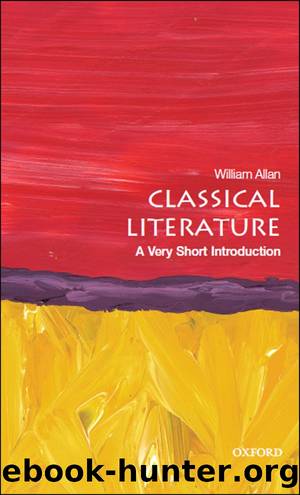Classical Literature: A Very Short Introduction by William Allan

Author:William Allan
Language: eng
Format: epub
Publisher: OUP Oxford
Published: 2014-02-14T16:00:00+00:00
Chapter 5
Historiography
In this chapter we will look at how the Greeks and Romans conceived and wrote about their past. As weâll see, since investigation of the past is always moulded by the present, the historianâs work tells us as much about his or her own period as it does about any other. Weâll consider the influence of other genres (for example, epic, tragedy, and oratory) on the writing of history, and the extent to which ancient writers engaged in what we would recognize as historical research, rather than simply recasting earlier writersâ versions of the past. We will also see how individual historians defended their claim to truth, and how the process of historical discovery could aim to explain many different thingsâPolybius on the rise of republican Rome, for example, or Sallust and Tacitus on its demise. Despite their shortcomings by modern standards of historical accuracy or impartiality, this chapter will also illustrate the great achievement of ancient historians, many of whom succeeded in gathering out of the way material and shaping it into a coherent narrative of complex events.
Historiography, the writing of âhistoryâ, defined as the scientific (i.e. evidence-based) investigation of the past, developed in Greece in the 5th century BC. But as weâve seen in previous chapters, we can (with caution) use pre-historical literature such as epic or lyric as a guide to early Greek history. For the Greeks themselves, the Homeric epics were the supreme examples of historical writing because they narrated the heroic origins of their society, and even pioneering historians like Herodotus and Thucydides, who took a more sceptical attitude to earlier (mythological) accounts of the past, especially those told by poets, considered Homer a valuable source of information on early Greek culture. Historians, both Greek and Roman, had to engage with epic, not least because they were dealing with very similar material: great wars and courageous acts, disastrous decisions and failures, survival and renewal. Indeed, from the very beginning history draws upon a wide range of other genres, from poetry in all its forms to philosophy and science, including geography and ethnography.
In the early historians we begin to see the idea that the mythical era is different from the historical era, and that the historian should focus on the latter, since only there can he check the evidence. There was no clear-cut dichotomy between myth and history, however, since people still took seriously their links to the mythical past, as when, for example, they boasted that their city was founded by a mythical hero or when aristocratic families claimed descent from the heroes themselves. Nonetheless, the earliest historians define themselves against myth, so that Herodotus emphasizes his focus on historical time, while Thucydides presents Herodotus and his predecessors as not sceptical enough about mythical or poetic accounts of the past, thereby boosting his own claim to accuracy and objectivity.
The earliest surviving historian, Herodotus, was heir to, and part of, a rational revolution that had its origins in the Greek cities of 6th-century BC Ionia
Download
This site does not store any files on its server. We only index and link to content provided by other sites. Please contact the content providers to delete copyright contents if any and email us, we'll remove relevant links or contents immediately.
The Power of Myth by Joseph Campbell & Bill Moyers(1068)
Half Moon Bay by Jonathan Kellerman & Jesse Kellerman(987)
A Social History of the Media by Peter Burke & Peter Burke(987)
Inseparable by Emma Donoghue(983)
The Nets of Modernism: Henry James, Virginia Woolf, James Joyce, and Sigmund Freud by Maud Ellmann(913)
The Spike by Mark Humphries;(812)
The Complete Correspondence 1928-1940 by Theodor W. Adorno & Walter Benjamin(789)
A Theory of Narrative Drawing by Simon Grennan(782)
Culture by Terry Eagleton(776)
Ideology by Eagleton Terry;(743)
World Philology by(719)
Farnsworth's Classical English Rhetoric by Ward Farnsworth(715)
Game of Thrones and Philosophy by William Irwin(712)
Bodies from the Library 3 by Tony Medawar(709)
High Albania by M. Edith Durham(705)
Adam Smith by Jonathan Conlin(695)
A Reader’s Companion to J. D. Salinger’s The Catcher in the Rye by Peter Beidler(688)
Monkey King by Wu Cheng'en(654)
Comic Genius: Portraits of Funny People by(652)
